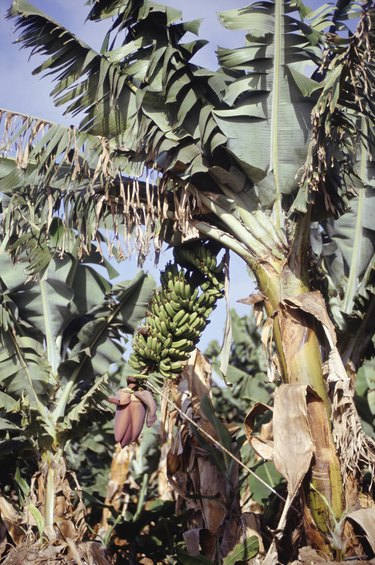
Bananas, native to tropical Southeast and South Asia, are renowned world over for their nutritious fruit. What is often referred to as a banana "tree" is really a nonwoody plant and its "bark" is the external covering of its upright stem. Various parts of the plant find different uses: banana fruit has extensive culinary applications; leaves function as an environmentally friendly equivalent of paper plates, as packing material for the transport of delicate fruit in Sri Lanka, and as wedding decorations in Haiti; roots are used to treat urinary tract problems; flowers are nutritious and have medicinal properties; and the stem has multiple medicinal, religious and nutritional uses.
Medicinal Uses
Video of the Day
According to H. Panda in the book "Herbal Foods and its Medicinal Values," mixing sap of the banana tree bark with coconut water makes an effective treatment of nervous insomnia, epilepsy, dysentery, vomiting and hysteria in traditional Indian medicine. The authors of the book "Speaking of Nature Cure" state that the liquid extract of banana tree bark is a remedy for urinary disorders, digestive disorders, to clear the arteries and reduce blood cholesterol.
Video of the Day
Religious Uses
The banana plant is revered for its religious symbolism in many parts of India. The Indian goddess Nanda Devi, the goddess of bliss, is carved from the bark. The Bengalis strew pieces of the bark during religious ceremonies commemorating the goddess Durga.
Banana Board and Paper
Banana board is a substitute wood product, similar to plywood, which is prepared from the bark of the banana plant. It is used for acoustic panels, partition walls, insulating panels, false ceilings, packing material and as expansion joint pads for bridge construction. Banana paper is made from the waste of the banana tree bark. The paper is semi-transparent and has a pronounced texture with dark chips and flecks. Banana paper is used for creative and decorative purposes.
Banana Fiber
Banana tree bark is a source of natural fiber. The fiber has superior mechanical properties, high modulus and tensile strength and is considered a suitable replacement for glass fibers in fiber-reinforced composites.
Nutritional Uses
Banana tree bark even has some dietary uses. Small shavings are used as a base ingredient in numerous traditional South Indian recipes, such as Banana Stem Curry and Banana Stem Mourkootu.